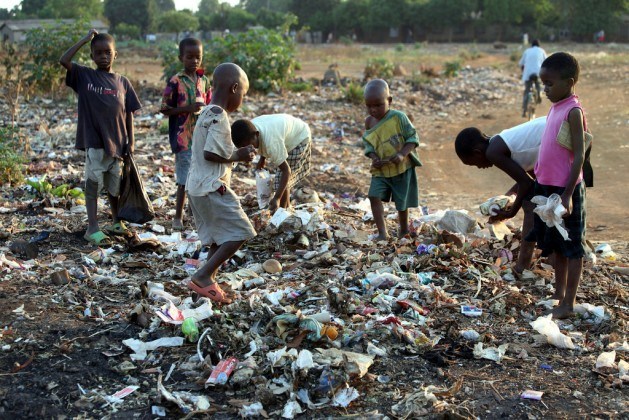Do you know a country referred to as a giant but is a developing country? It’s Nigeria.
Over the years, Nigeria has struggled with a lot of economic crisis, which led to a rapid increase in the percentage of poor people. A poor person in Nigeria is a person who cannot afford basic things of life such as, shelter, food, clothes, education, and so on.
There have been hopes that Nigeria can come out of this poverty stigma through different vision programmes. But the question we should ask ourselves is, “can Nigeria be free from poverty?
Earlier this year, the federal government of Nigeria launched the Imagine Nigeria report jointly with the United Nations Development Programme (UNDP) under a larger development framework that explores alternative pathways to further Nigeria’s development.

About 33% of Nigerians live in poverty
As explained by Vice President Yemi Osinbajo, Imagine Nigeria recognises numerous unexplored prospects that citizens can harness for national transformation. The report notes that going green is in Nigeria’s best interest and that it is a strategic choice that, if fully pursued, can allow Nigeria to take advantage of an emerging global push towards low-carbon economies.
The green economy is posed to improves human well-being and social equity while significantly reducing environmental risks and ecological scarcities. In summary, the whole concept of the green economy is about using renewable energy.
This development path should maintain, enhance and, where necessary, rebuild natural capital as a critical economic asset and source of public benefits, especially for underprivileged people whose livelihoods and security depend strongly on nature.
Table of Contents
How Can the Green Economy Alleviate Poverty In Nigeria?
According to the World Bank, Nigeria aspires to lift its people out of poverty by 2030. Some would say this is an ambitious target, as even before COVID-19 struck, four in ten Nigerians lived below the poverty line of about 80 million people.
The green economy is a thriving economy that delivers considerable economic, social and environmental benefits sought by the Sustainable Development Goals and the Paris Agreement.
The green economy initiatives include programmes such as: Feed-in tariffs in Kenya, organic agriculture in Uganda, the Tunisian solar programme, the Agulhas ecotourism in South Africa and the Brazilian biofuel policy.
These initiatives continue to impact people’s lives daily with an evident reduction in greenhouse gas emissions. Apart from this, it has also led to a decrease in environmental emergencies.
A pragmatic approach to the green economy is required to tailor strategies for solving Nigeria’s most critical problem, alleviating poverty.
A major way to begin this is to end the unsustainable subsidy regime and redirect a significant portion of the fund for up-front expenses required to catalyse the green economy.
-
Creation of economic opportunities
Greening the Nigerian economy offers an important opportunity to reduce Nigeria’s dependence on fossil fuels, leading to the use of other resources.
The Nigeria Circular Economy Working Group is playing its part in promoting economic models that change production and consumption systems and encourage efficiency in using Nigeria’s abundant natural resources.
It has also launched research to take stock of the country’s ongoing circular economy and natural capital activities and recommend workable scenarios to attract circular public and private investments, thereby creating economic opportunities for the people.
-
Better income opportunities
A greener economy will provide better income opportunities for poverty reduction and social inclusion, especially in Nigeria, where the number of poor Nigerians has skyrocketed.
Implementing the green economy effectively as a country will attract foreign investors and other companies boosting the economy of the country, hence, improving the standard of living of the people.
-
Creation of jobs
About 25,000 jobs stand to be created through green public transport initiatives and 12 million jobs through a massive increase in renewable energy; these will help reduce the current 33.3% unemployment rate in the country.
Energy poverty and insecurity are tackled by leveraging Nigeria’s ‘limitless’ solar energy potential and our substantial biofuel prospects. This will foster a need for more hands to be trained and the employment of many. This will assist in enhancing energy supply security and reduce the country’s exposure to volatilities in the global fossil fuel market.
Read Also: The Problems Facing Nigeria as a Country: Is Nigeria Still the ‘Giant Of Africa’
-
Generation of revenue
The severe poverty amid plenty and the extensive environmental degradation across all regions in Nigeria is linked to a high dependence on the exploitation of natural resources and inefficient livelihood activities, reinforcing the cycle of underdevelopment.
However, adopting a green economy will allow unions and groups to develop guidelines for cultivating these natural resources. This will help educate the public, provide a means of livelihood for the people, and create an avenue to generate revenue for the government.
Read Also: Importation of Goods Into Nigeria Has Done More Harm Than Good To The Economy
-
Increase productivity
The necessity for greening products and processes is aided by growing opportunities about market desirability and added value. Sustainable agriculture methods can increase productively, and there will be a growing market for business-to-business trade in the verification and certification of production methods and goods.
There is also an increase in the production of agricultural goods, leading to an increase in the availability of food to all.
A popular adage states, “once you have good food to eat, half of your problem is solved.”
Subscribe to our newsletter to get update on interesting content like this one.
-
Sustainable livelihood
Due to the unprecedented impact of COVID-19, the economic downturn and the sequence rise in inflation in the country, different companies and institutions laid off their workers, thereby increasing the unemployment rate and leaving many out of jobs to cope with the high standard of living.
With the implementation of the green economy, there is the assurance of a sustainable livelihood, and job layoffs will be drastically reduced.
-
Decarbonisation of the Nigerian economy
In addition to exacerbating poverty, inequality and environmental risks, climate change adversely impacts the growth of the Nigerian economy both in the long run.
A green economy will lead to the decarbonisation of the Nigerian economy and help the country achieve the net-zero target for 2050 to 2070, as enshrined in Climate Change Act 2021.
Conclusion
The green economy can help Nigeria build a more inclusive, resilient and prosperous nation. It can help overcome prevailing challenges, such as the unprecedented impact of COVID-19, diminishing oil revenue, climate change, social inequality, poverty, and insecurity.
Hey, come join our Whatsapp community to discuss the solutions the green economy can provide to developing countries.
About Author
-
Adedokun Boluwatife is a content, Ghostwriter, and Medical student.
She uses storytelling to write compelling articles and books. Writing is the greatest instrument to share what she knows with the world. Proficiency is a skill she always wields.
Latest entries


 Business InsightsFebruary 12, 2024How to do Twitter Advanced Search and What it Means for Your Nigerian Business
Business InsightsFebruary 12, 2024How to do Twitter Advanced Search and What it Means for Your Nigerian Business

